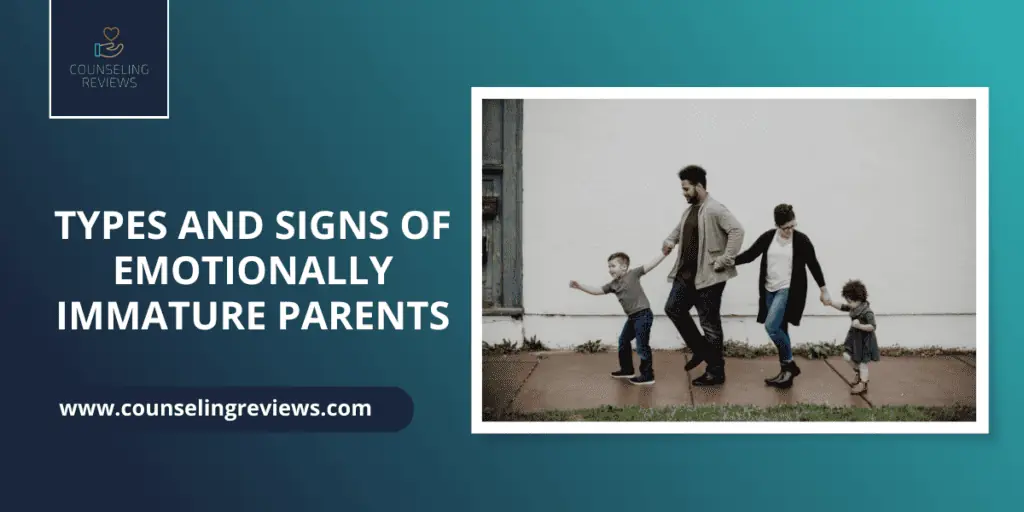As parents, our hope is to raise our children better than the generation before us. Most parents recognize they are far from perfect and though they attempt to raise their children with the best of intentions, sometimes parents struggle to achieve the high standard of parenting they set for themselves.
Parents may yell at times when they don’t want to, or act immature towards their kids when they aren’t supposed to, parents are human and fallible. Healthy parents will apologize and explain why they reacted that way. Emotionally immature parents typically do not apologize for their behavior and instead, place the responsibility on their children to make things better.
In this article, we will discuss emotionally immature parents (EIP), a term coined by clinical psychologist, Lindsay Gibson, the characteristics of EIP parents, the consequences for children raised by EI parents, and lastly, how to treat EI parents.
Types of emotionally immature parents
Dr. Lindsay Gibson developed the framework for describing four different types of emotionally immature parents. It is important to note, these descriptions are not intended as diagnosis and therefore, are not in the DSM5 (Diagnostic and Statistical Manual for Mental Disorders).
Emotional Parents
The emotional parent acts emotionally unstable. They can vacillate between being anxious and vulnerable to volatile and manipulative. Their priority is keeping their mental well-being in homeostasis and any interference with their inner “peace” creates massive upset, resulting in negative reactions.
The emotional parent may be overly involved and then completely absent. Icing out their children is a common punishment if the EIP perceives an emotional upset. They may act dramatically over small injustices and throw tantrums.
They seek a peer relationship with their children or they seek a relationship in which their children parent them. This role reversal creates a dynamic that does not allow the parent to be a parent or the child to be a child.
Driven Parents
These parents tend to look like they have it all together from the outside. They may even be referred to as “tiger parents.” These parents are overly invested in their child’s success and come across as very controlling.
Driven parents tend to overschedule their kids as well as themselves. They place great importance on achievements and success and tend to measure their children’s value based on their performance.
While their kids may demonstrate unique interests or talents, a driven parent will not be interested in nurturing these qualities if they are in opposition to what they consider acceptable interests and talents.
These parents expect full cooperation. The goals of the driven parent should be in alignment with their children’s goals and if they aren’t, then the EIP may react angrily or shame their child.
Passive Parents
These parents may look as though they are emotionally available but they tend to avoid upsetting matters. They often minimize situations or feelings that are too uncomfortable for them to process.
Passive parents rarely impose boundaries or guidance. From the outside, these parents may appear as the “good cop” in the parent relationship. Children know not to ask or expect much help from this type of parent.
Rejecting Parent
This parent often appears detached, cold, and harsh. This parent may have never wanted kids and or regrets having kids and is essentially checked out of their nurturing role.
These parents prefer to be left alone and are uninvolved in their children’s lives. They are very unattached to their child’s interests. They typically are the rulers of the home and can swing between isolating themselves and angry outbursts.
Characteristics of emotionally immature parents
- Difficulty admitting they are wrong
- Difficulty apologizing for poor behavior
- Poor self-awareness
- Poor differentiation
- Poor emotional regulation
- Difficulty taking accountability for their behavior
- Tend to hide their faults around others
- Place high importance on how others perceive them
- Gaslight others
These characteristics lead to unhealthy relationship dynamics with their children, causing major emotional harm to their children. Since emotionally immature parents place a high value on outward appearances, children are often not served by outside support and consequently, don’t have the validation to recognize their parents as unhealthy.
The consequences of emotionally immature parents
Unfortunately, many of these emotionally immature parents were raised by EIPs themselves. The cycle is easy to repeat when one lacks self-awareness and support. Parents who don’t seek help and support may develop lifelong regrets that they weren’t able to be the parents they had hoped they would be. Consequently, they miss out on a deeply valuable relationship with their children and may find themselves “cut out” of their adult children’s lives.
The effects of emotionally immature parents on their children
Children raised by EIPs experience several negative effects. For one, children tend to doubt themselves because of the gaslighting they experience from these types of parents. They grow up not trusting their own emotional and cognitive responses to situations after years of being told they are incorrect.
Often, adult children of these parents will subconsciously replicate intimate partnerships with an emotionally immature spouse. The behavior is familiar to them, they already have the skills to navigate these types of personalities and essentially, feel a false sense of safety in a familiar dynamic.
Children of rejecting parents can experience severe low self-esteem and suicidal ideation. Feeling rejected by a parent is one of the worst forms of emotional and verbal abuse a child can experience. Conversely, children of rejecting parents may be over-achievers in an attempt to build value for themselves.
How to treat emotionally immature parents
Luckily, there is support available to these parents. Though these personality types are rather deeply rooted and difficult to treat, there is hope with therapy. One of the best forms of therapy to treat EIPs is cognitive behavioral therapy (CBT).
CBT is a well-established form of therapy that examines clients’ thoughts and emotions and analyzes how these thoughts and emotions affect behavior. The goal of therapy is to challenge maladaptive thoughts and emotions and replace them with more realistic and healthy thoughts and emotions. Subsequently, behavior is improved with the replacement of more realistic thoughts and emotions.
Parenting classes can also be very helpful for these parents. Psychoeducational classes focused on nurturing relationships and understanding the needs of various childhood stages, will help parents develop more realistic expectations of parenting.
Support groups for these parents can also be very helpful. Since EIPs are typically the result of being raised by EIPs themselves, a support group can be tremendously helpful in EIPs cultivating empathy for themselves as well as for their children.
Final thoughts
Parenting isn’t easy under the best of circumstances but it is even more challenging when emotionally immature parents lack the self-awareness to make positive changes to the ways in which they parent.
For those who are adult children of EIPs, therapy can be abundantly beneficial in healing your own trauma as well as preventing you from repeating the abusive cycle within your own nuclear family.
If you are an EIP or a child of an EIP, support is effective and available. Don’t hesitate to get the help you deserve. Whether online therapy or in-person, therapy is a wonderful tool to help you develop the coping skills necessary to heal and live life differently.





